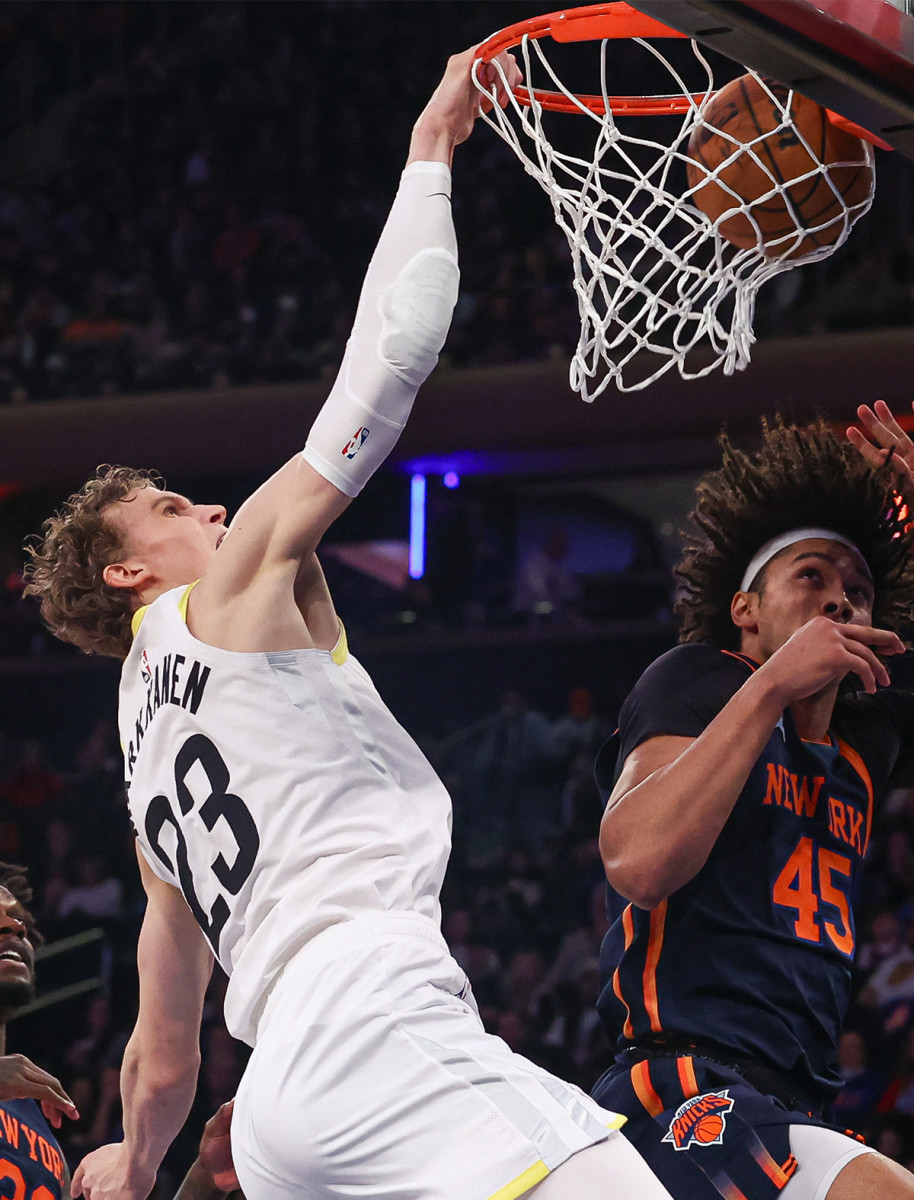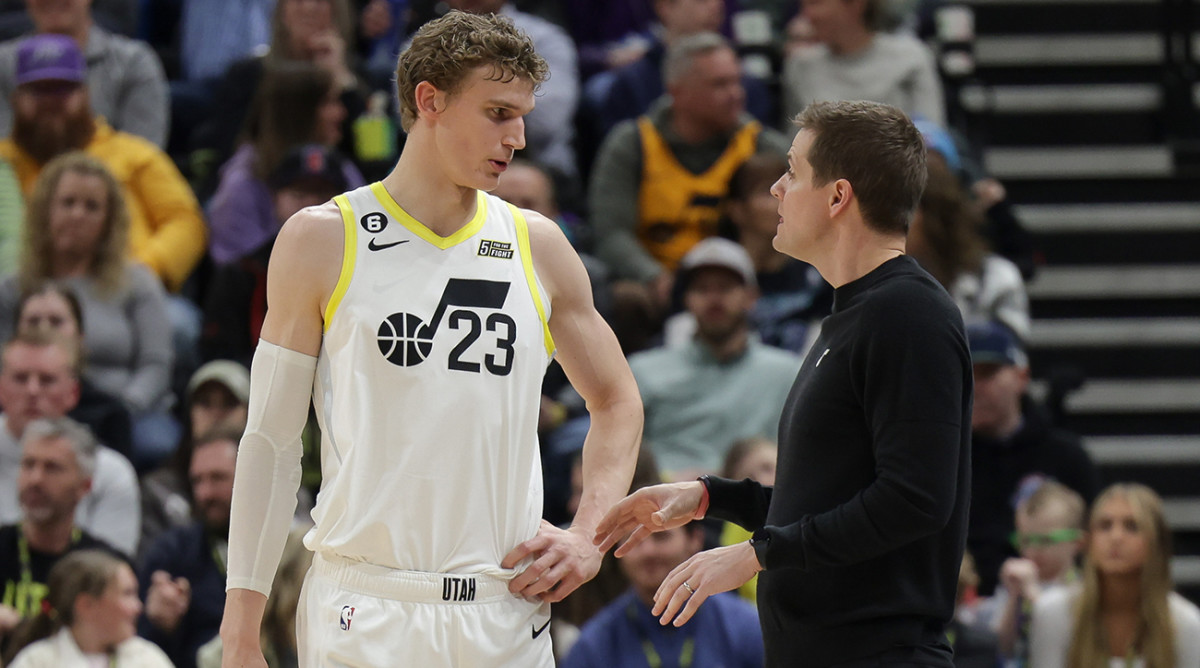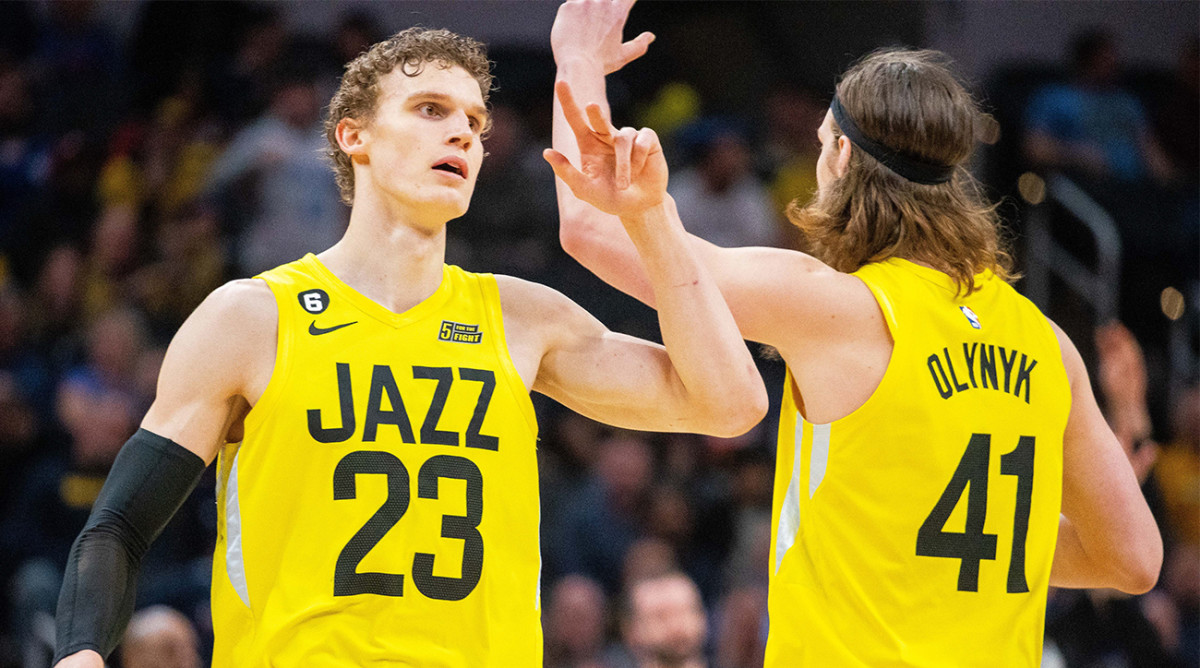The Unexpected Rise of Lauri Markkanen
The first time Lauri Markkanen received a call from Jazz head coach Will Hardy, he didn’t pick up.
It was approaching midnight in Prague on the first day of September. Back in the States, the NBA world was abuzz—star guard Donovan Mitchell was headed to the Cavaliers in a shocking blockbuster trade. Markkanen was wrapping up his night, finishing a round of video games with his teammates a little over 14 hours before Finland’s first game of the 2022 EuroBasket tournament. When he first caught wind of the trade, Markkanen was intrigued at the prospect of playing with Mitchell, then joked with his teammates that he’ll have to see who was part of the deal before getting too excited.
That’s when Markkanen’s phone first rang. He saw it was Cavs GM Koby Altman, and then Markkanen quickly realized he would be headed back to Utah in the deal. It would be Lauri’s third team in three seasons. Later, when he saw a U.S. phone number attempting to FaceTime him, he correctly assumed it was Hardy. And he wasn’t ready to talk.
“That was tough the night that it happened,” Markkanen says. “I can be honest and say it was emotional. It was emotional leaving because in Cleveland we really had a fun year.”
Hardy was persistent, though. He sent Markkanen a text soon after to make sure he was still awake. He called again, and this time his new seven-footer picked up.
“He was rightfully a little shocked, a little taken aback, and not really sure what to think,” Hardy recalls of the conversation. “He’s halfway around the world, it’s the middle of the night and he’s about to play a game the next day for his national team.”
Hardy and Markkanen spoke for only a few minutes. The coach started with saying how excited he was to connect with Lauri as a player, but largely made it a point to emphasize he understood how hard the situation was for Markkanen. Within an hour after speaking, Markkanen sent a text back, thanking Hardy for checking in, and saying he was still processing his emotions as a result of the trade. After the initial call, Hardy would keep in touch with his soon-to-be star forward throughout the EuroBasket tournament.
“I’ve been fortunate to coach a lot of players that have played for their national teams, and I understand how important that is,” Hardy says. “And so the message the whole time was just focus on that; be all in. And we’ll get to the Jazz when we get to the Jazz.”

Let’s get to the Jazz, shall we? Headed into the All-Star break in Salt Lake City, Utah remains in the thick of the Western Conference playoff race, within four games of fourth place even after some trade deadline maneuvering. And at the heart of the team’s surprising success has been Markkanen, who will represent the hometown team in the All-Star Game after earning his first selection.
The Finnisher is averaging 24.9 points and 8.6 rebounds a night nearly three quarters of the way through the regular season. He’s averaging career bests in both of those categories, as well as [pause for a deep breath] minutes, field goal percentage, three-point percentage, free throw attempts and steals. And for his efforts, he’s achieved his personal goal of being named an All-Star.
“I had a tough little stretch for two years, so hearing my name was cool,” Markkanen says. He found out he had made the team like the rest of the world, watching TNT’s pregame show announce the reserves. “Immediately it felt better because of the journey. I had struggles and I was thankful to get another shot. I had down years my third and fourth year. Not everybody gets a second chance. And even though I had those down years, they still trusted me here.”
Markkanen’s journey began in Finland, the son of two professional basketball players, Pekka and Riikka. He played several sports growing up, including seven years of soccer and also gathering his friends to play ice hockey in the winters. (Markkanen says he grew too tall; otherwise he would’ve loved to play goalie.) He thrived at hoops, though, and played professionally in Finland before committing to Arizona in 2015. He played one year for the Wildcats and was highly touted entering the draft, renowned for his shooting stroke.
In 2017, the year Markkanen was drafted by the Timberwolves and then traded to Chicago in the Jimmy Butler deal, his skill set represented the new wave of NBA basketball: big men who could shoot. He was projected as a power forward, with the potential to play some small-ball five. And that’s where Markkanen largely resided during his up-and-down, four-year tenure with the Bulls. In his first three seasons, he played 100% of his minutes at either power forward or center, and more than 90% in his fourth season.
Markkanen’s Chicago tenure was marked by instability. He played for three different coaches. After his points and minutes per game averages rose from his rookie to sophomore season, they decreased in each of the next two years. The Bulls did not sign him to an extension before his fourth season. In the summer of 2021 he entered restricted free agency and toiled in limbo for weeks as big names came off the board in early July. It wasn’t until late August when Markkanen finally found a new home in Cleveland. The Cavs acquired him in a sign-and-trade that left people scratching their heads at the time. The team traded for center Jarrett Allen the previous season and drafted seven-footer Evan Mobley in the lottery. And now Markkanen was going to play small forward?
Before his trade to the Cavs, Markkanen realized he needed to change his game. He was frustrated with the end of his time with Chicago. And for the first time in his career, he was his own boss in the offseason. Markkanen’s biggest goal was to play with much more athleticism than he’d displayed with the Bulls. He contacted Jani Parkkinen, a former Finnish basketball player whom Markkanen knew from his early playing days. Parkkinen was now a personal trainer, and in a gym in the town of Jyväskylä, they got to work on a program Markkanen says may have “saved his career.”
They worked on Markkanen’s lateral movement and explosiveness, or put more simply, Markkanen wanted to run faster and jump higher. The program proved prescient. After his trade to the Cavs, Markkanen was initially projected to be Mobley’s backup at power forward. But then Cleveland coach J.B. Bickerstaff noticed how well Markkanen was moving in the preseason and asked him whether he would be able to guard small forwards.
“I was actually able to do it and earn the starting spot again,” Markkanen says. He proved he could handle a new role. In his lone year in Cleveland, Markkanen played the majority of his minutes at the three for the first time in his career. The three-big lineups that first appeared to be a clunky fit actually thrived. In the 621 minutes Allen, Mobley and Markkanen shared the floor, the Cavs were a plus-102, including a 102.0 defensive rating.
While Cleveland was a pleasant surprise, Markkanen wasn’t the team’s first scoring option. When the Jazz decided to move on from Mitchell however, they sensed an opportunity to aim for more than the oft-lauded haul of draft picks.

“When we got to the pivot point that we did and decided to look at moving on from two All-Stars, we looked specifically for deals that included players,” says Jazz general manager Justin Zanik, referencing the decision to move not only Mitchell but Rudy Gobert, as well. “Lauri is somebody we really, really wanted if we were going to move Donovan. He’s just such a rare archetype. Maybe early in his career, people pigeonholed him in to just a tall jump shooter. But he’s high character, he works hard and he continues to get better.”
Hardy noticed early in camp Markkanen could be a key cog in whatever the Jazz were going to be. To acclimate all the new faces before the season, Hardy employed a lot more five-on-five scrimmages as opposed to drill work and installing plays to accelerate the cohesion of his group. It was during those basic structure practices Hardy noticed Markkanen’s capabilities. Despite not having many plays designed or called for him, Markkanen would routinely be the most effective player on the floor.
“And it was a variety of things,” says Hardy. “It’s not all threes. It’s not all post-ups. It’s not all cuts. It’s not all isolation. It’s not all pick-and-roll. It’s a little bit of everything.”
One of Hardy’s core tenets with this Jazz team has been to not make the system revolve around one player. Yet early in the season, he noticed time and time again Markkanen would end up scoring 20 points despite not being featured over anyone else. So Hardy steadily added more to his plate, especially as Markkanen maintained his efficiency. And while his individual responsibilities grew, Markkanen remained committed to the Jazz’s team concepts.
“That’s the part about Lauri that’s been so fun; he’s never asked me for anything,” Hardy says. “He’s never come to me and gone, ‘I want it on this block,’ or ‘Hey, I want more of this.’ He’s happy for his teammates and he’s not thinking about his own numbers. He’s done all of this without chasing it, which makes it that much sweeter.”
What Markkanen has done is turn himself into one of the game’s most unique scorers. He is one of only 12 players shooting at least 4.5 field goals within the restricted area and 5.5 above-the-break threes. Of those 12, Markkanen is the only seven-footer. And among that group, he’s second only to the player he was traded for—Mitchell—in above-the-break three-point percentage. Overall, Markkanen is the only seven-footer among the players shooting at least seven threes a game. And he’s fourth in three-point percentage among those 36 players, ahead of the likes of Mitchell, Klay Thompson, James Harden and Damian Lillard.
“His versatility is what makes him who he is,” says Mike Conley, Markkanen’s former teammate who was traded to the Timberwolves at the trade deadline. Conley says Markkanen is a “point guard’s dream” because of his ability to come off screens and shoot over the top of anyone, while adding he’s also difficult to handle in transition. Hardy makes intelligent use of Markkanen’s size. He’s often involved in actions as a screener to pry him loose in the paint and on the perimeter. Markkanen will also zoom around screens for catch-and-shoot threes, particularly if teams try to hide a slower-footed big on him, as the Jazz try to take advantage of players not suited to seven-footers scurrying like a shooting guard.
Markkanen’s variety has allowed him to remain effective even as he notices teams trying harder to scheme against him during his film work. From November through January, Markkanen increased his scoring average each month, despite drawing higher-caliber defenders and more physical obstacles as opponents make him the focal point of their scouting report.
“It’s fun because of the group we have,” Markkanen says of his ascension to No. 1 option. “They trust me and they believe in me. It’s a fun responsibility to have, but I don’t feel like I need to do it by myself. I know my opportunities are going to come because of my teammates and coaching staff.”

Markkanen is not keen to hype up his own success, even though he’s been challenged constantly during what he calls a nonlinear journey. Though he may throw down the aggressive tomahawk or two on the court, away from the game, Markkanen is mild-mannered and measured with his words. Teammates say they can recognize his drive to be great and the pride he feels as an All-Star, even if as Conley puts it, Markkanen “hasn’t really belted out his happiness.”
“You could just tell the way he approached every day he was on a mission to prove who he is,” says Conley. “And whether he made the All-Star team or not, he accomplished his goal. He’s showed people he can be this guy.”
And Markkanen has done all of this for a team almost nobody expected to be competitive. Zanik calls the preseason discourse around the Jazz “off putting.” Hardy, when politely presented with the opinion that expectations for Utah before the season were all over the place, is quick to respond, “No, they weren’t. Expectations? Everybody said we were going to be bad.”
A large reason for the negativity is few predicted Markkanen would take the leap he’s made this year. He’s not only turned himself into an All-Star. For the first time in years, it seems a team actually considers him a building block for its future. When asked specifically whether Lauri would be a significant part of the franchise moving forward, Zanik is quick to put any rumors to rest: “That’s not a hard answer at all. He ain’t going anywhere.”
“It feels good having people trust me,” says Markkanen of Zanik’s confidence in him. “I’ve seen obviously that anything can happen. Most importantly, I think it’s best for my family to hear that, too. Maybe we can find a home here and kind of settle in a little bit.”
